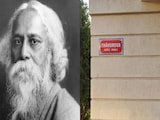The NHRC has issued a notice to the Railways over a complaint that "only halal-processed meat" is served in trains, which creates an "unfair discrimination" and amounts to "violations of human rights".
The complaint has further alleged that the practice in Indian Railways trains excludes people from Hindu Dalit communities, who traditionally work in the meat trade and therefore harms their livelihood rights and equal opportunities.
There was no immediate reaction from the railway authorities.
The National Human Rights Commission, in proceedings related to a case in the matter dated November 24, has said that the allegations made in the complaint prima facie seem to be violations of human rights.
The NHRC said that the practice of selling only halal meat "badly affects" the livelihood of Hindu Scheduled Caste communities and other non-Muslim communities. The railway, being a government agency, should respect the right to the choice of food of people of all religious faiths "as per the secular spirit of the Constitution of India".
A bench of the NHRC, presided by its member Priyank Kanoongo, has taken cognisance of the complaint by Sunil Ahirwar from Bhopal under section 12 of the Protection of Human Rights Act, 1993.
"The registry is directed to issue a notice to the Chairman, Railway Board, New Delhi, with directions to get the allegations made in the complaint inquired into, and to submit an action taken report within two weeks for perusal of the Commission," it said.
According to the proceedings of the case, the complainant has alleged that the "Indian Railways serves only halal-processed meat in non-vegetarian meals, which creates unfair discrimination and causes human-rights violations".
The complainant also alleged that "Hindu and Sikh passengers do not get food options that match their religious beliefs, affecting their freedom of choice and religious rights which violates their rights to equality, non-discrimination, freedom of profession, right to life with dignity and religious freedom under Articles 14, 15, 19(1)(g), 21 and 25 of the Constitution..." He said it is "contrary to the principles laid down in cases of Olga Tellis (1985), Indian Young Lawyers Association (2018), State of Karnataka v. Appa Balu Ingale (1995) and NHRC v. State of Gujarat (2009).
The complainant has stated that such a policy in a government-run system allegedly appears to "violate" the principles of equality, secularism, non-discrimination, and the right to livelihood.
The complainant sought the intervention of the commission in the matter and requested urgent action, according to the proceedings of the case.
(Except for the headline, this story has not been edited by NDTV staff and is published from a syndicated feed.)















